#nanbei dynasty
Text
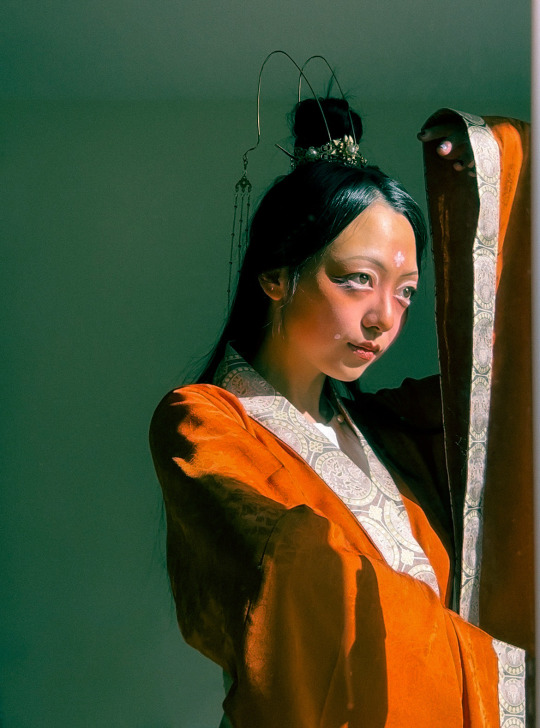
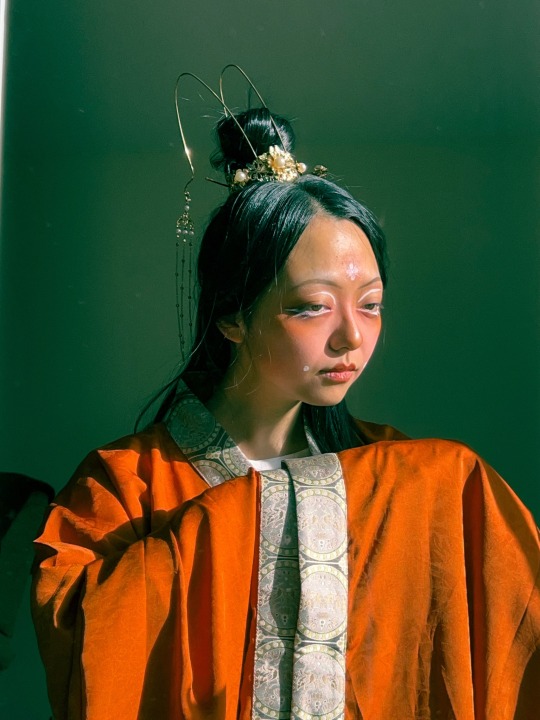
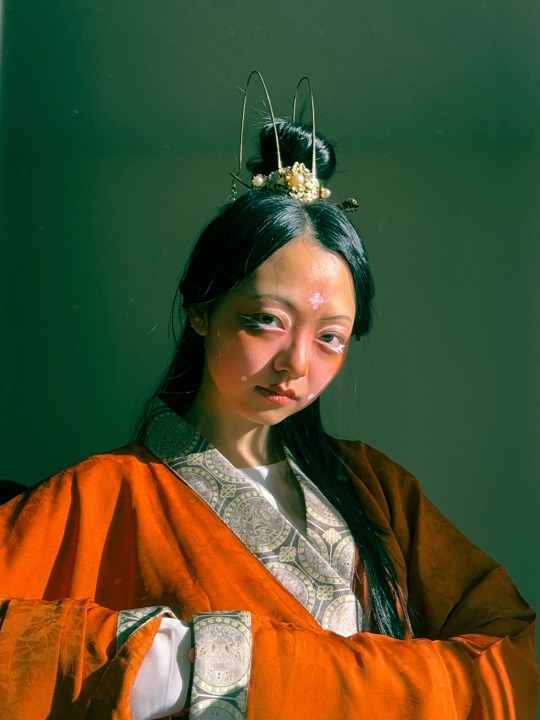
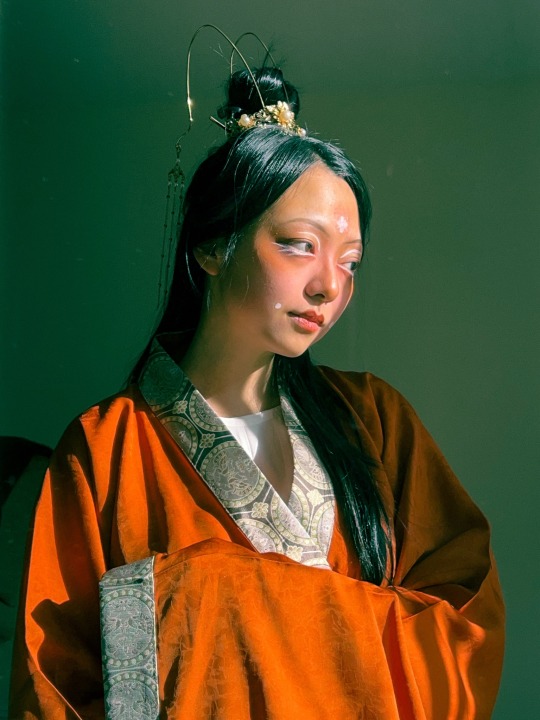
ᴛᴀᴋᴇ ᴍᴇ ᴛᴏ ᴛʜᴇ ʀɪᴠᴇʀ ᴀɴᴅ ʙᴀᴛʜᴇ ᴍᴇ ᴄʟᴇᴀɴ
以河水为予净身
#yovo does a face#chinese hanfu#hanfu fashion#南北朝#south and north dynasty#nanbei dynasty#historical fashion#your hanfu girl <3#Hanfu core#hanfu#汉服#aesthetic
50 notes
·
View notes
Photo
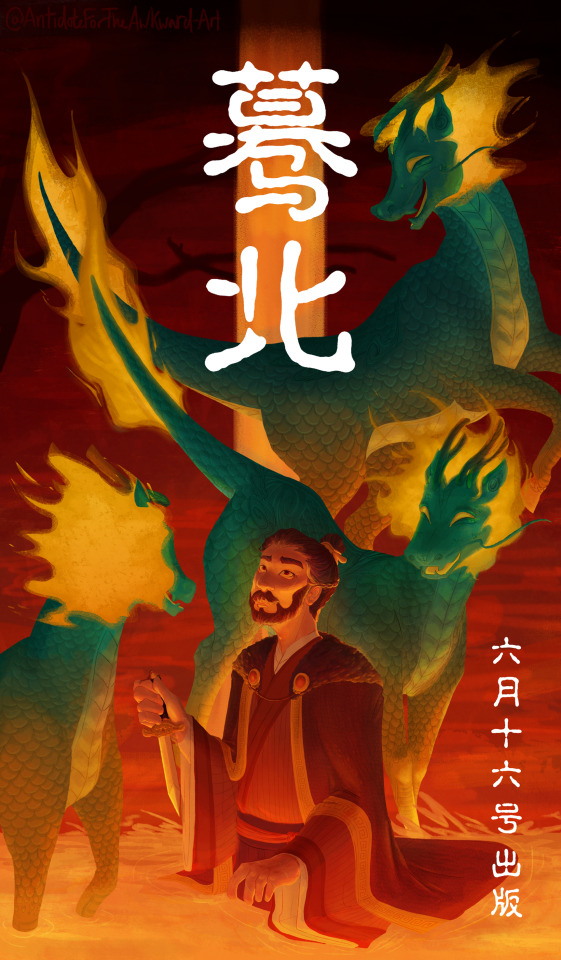
“Is this a dagger which I see before me?”
#my art#William Shakespeare#Macbeth#Qilin#visual development#HELLO I AM BACK WITH A MOCK MOVIE POSTER FOR MY NANBEI DYNASTY MACBETH AU#Macbeth would make such a good supernatural palace scandal cdrama...#also I tried to push the colors on this piece and im SO happy with how it came out#I died rendering the qilin though.....#yes theyre my witch standins :D#also the Chinese I chose for Macbeth only really sounds correct if you use Cantonese#yeah there's an official Chinese version of Macbeth's name but it was three characters and I wanted to shorten it to two characters so itd*#*be better integrated with the ancient Chinese setting#also canto represent hehe#Makbak#The Nanbei Tragedy#literature
143 notes
·
View notes
Text
he common saying "from words詞 to songs曲"
he common saying "from words to songs"
From ancient China, there was a way of writing songs based on lyrics. That is, the music has been written first, and then the lyrics are entered. This way to today is popular in the popular song industry. Zeng Wen, a pop song producer, talked about it. He often found a beautiful song first, and then found a rhetoric. According to this, the reason for the popularity of songs in this way is related to the scarcity of music composition. A beautiful music is a rare gift from the world. How many composers have a lot of stories about the world, talking about how he was inspired by the moment, wrote the music that was handed down. Compared with the writing of the music, the remarkers are not the focus of the song. The ancients pointed out that the popular songs, whose songs are not in the eyes of scholars, are popular because of the good music. How many literati are heartbroken. From ancient times to the present, there will be beautiful music for the sake of popularity, so the music is written first, and then filled in the song resignation, has become a mainstream fashion of song production.
Moreover, in ancient times, music composition was often written by musicians in the society. They often filled in the words of their writers in the music, because they are not low in the society, so the level of literature is generally not high. Its lyrics are not in the eyes of literati. There are also no less than the completion of music, and then find the poems of famous poets in the world. In the Tang and Song Dynasties, there were many anecdotes in the world, and they were also passed down by future generations. That is, as early as the late Han Dynasty Cao Wei era, when Cao Zhi went to the melody of the existing Qing dynasty melody to fill the words, he was satirized by Wen Xin Diao Long because of the incompatibility of the rhyme, saying that he lyrics with music is not Good, and I don’t want to find someone to swear, so I am ridiculed. It was early in the Western Zhou Dynasty feudal society to the early Eastern Zhou Dynasty. The poems of the Book of Songs may have been written earlier than music. But all of them have been re-created under the existing music. This is especially clear in the national style. In fact, there are many books that analyze music from the scriptures. For example, the Book of Songs often has multiple paragraphs of text. Each paragraph has only a few words. In fact, even if there is a poem written by a national style, there may be only a short period of time. Later, Zhou Taishi, when finishing the poem containing music, find or create After the folk songs of various countries, they put the short poems into the first paragraph, with the multi-segment style, and then put the original short poems in the second paragraph into the second paragraph of repeated music, and so on. . ...... Therefore, according to the lyrics of the first written on the music, and then put the song into the song, there are precedents in the Western Zhou Dynasty. From the Book of Songs to the "Advocacy" of the Han, Wei, and Jin (or "Yu Le" that was renamed because of the use of Buddhist scriptures since the Wei and Jin Dynasties), and then to the Southern and Northern Dynasties, the Southern Dynasty changed its name to "Lefu" because of the Yuefu Order. Then, in the Tang Dynasty, Hu Le changed to Han Lehua, and the resulting "words" were born according to Yan Le, which had already flowed in before the attachment.
The names of the words often extend to the Song Dynasty, but the music is often rewritten. Therefore, the same word cards, the Tang Dynasty teachings or the Dunhuang songs have this, the five generations have this, the Northern Song Dynasty has this, even the names of the late Song Dynasty poems, but the words are different. For those who have big mistakes in the word grid, the word name is used in the generation of words according to the lyrics, but the music is surprisingly changed by the popular songs. Another good music comes out, the words of the same brand name. The grid has changed. That is because the music changed, and another musician created a new melody for the lyrics, but the melody is different from the music of the original placard, so the lyricist re-filled the new words with new words.
In the later generations of the lexicon, often the same placard lists the original and more than one body. In fact, the so-called singularity and another body are not the times, the music of the folk music is new, and the lyrics of the lyrics change. This kind of master-slave relationship, music-based, songs are slaves, because the music will change in decades, so the same word card, how the Tang Dynasty teaching songs are sung, until the end of the Tang, I don’t know, and then there is new music, In Dunhuang Quli, this lyric has new music, so the word changes, the lyrics are filled, the cavity changes, the words must be followed, and the word changes are also produced. It was changed again in the Five Dynasties, and changed again in the early Northern Song Dynasty. When it was in the Northern Song Dynasty, it changed again............. In the Southern Song Dynasty, the music of the Northern Song Dynasty was lost, so there was music and innovation. People with new words.
In my opinion, in the era of words, there are so many words in a word card, which are displayed in the lyrics, but each word is the imprint of music of an era. In fact, the posterity of these words that have lost music, if you want to fill in the literati style, do not have to pay attention to the so-called positive character of the lyrics, in fact, each cell is the era mark of the lyricist who represents the era of someone alone, it should be equivalent It. The lyricist can fill in the words of the person.
Let's look at the word to the song, what happened. Song Ci in the Northern Song Dynasty, it is not only the lyrics, but not only the lyrics and Song lyrics collected in the "Full Song Ci". There are many popular words in the society that are different from those of the literati who are collected as "All Songs", and others. The "common words" sung by the singer and the singer (can only be named and so named), these popular words are popular because of their popularity, they are also fast-moving, and they are not literati, no publications, no records, so Lost in later generations, and not included in the hundreds of songs in the "Yan Le Shu" of the Song Dynasty. However, many of these vulgar words played a role in the Southern Song and the Jin Dynasty in the South Opera and the Palace. The South Opera is the ancestor of Nanqu, and the Jin Dynasty Palaces are the ancestors of the Northern Song.
Many of the lyrics of the South Opera and the lyrics of the Jin Dynasty Palace have not appeared in the literary cards of the previous literature in the existing literature. Perhaps there are many "common words" in the Northern Song Dynasty and the Southern Song Dynasty, but there is no clear literature, a few have The plaques that appeared in the books of the Song and Yuan Dynasties later appeared in the Jin Dynasty Palace and became one of the evidences of the "common words." Judging from the lyrics of the lyrics, the melody of the Nan opera and the Jin Dynasty Zhu Gong Tuan does not exist today. The scores of the Jin Dynasty Zhuji, as collected by the Jiugong Dacheng Nanbei Cimeter, are from the late Ming and early Qing dynasties. Created, non-Golden Palaces adjust the original original tune.
From the point of view of the word to the song, the essence of the song has not changed. It is from the point of view of the text. It is the lyrics of the soundtrack. There is a melody of the song first, and then the lyricist fills in the song. The nature of the word and the song has not changed. Later generations of lyrics and songs, such as Zheng Yu and others, are very inappropriate, thinking that there will be different styles in the words and songs. In fact, it is exactly the same, the word is the song, the song is the word.
The words of the Tang and Song Dynasties are songs, because the name of the word "曲" was not loud at the time, not no. But later, when it came to the South Opera and the Jin Dynasty Zhuqu, the word was changed to the song, but the times changed, and the Song word was renamed "Daqu" (can be seen in the Yuan Dynasty published by the Yuan Dynasty), and an important thing happened. That is, Chinese opera has happened in the era of Qu. The song was used in the script. In the era of the Song Dynasty poetry, there is no set of sets, such as Daqu, etc. can be counted as sets, such as wraps, wraps and earns are all sets, but did not become a copy of the script. At the beginning of the era of music, the beginning of the two Songs, the palaces and so on, the song became the new name of the new word, and also played an important part of the composition of the opera.
It can also be a single line, like a word, that is, it is called "small order" in the song. We have a comparison between Xiao Ling and the Tang and Five Dynasties and Song's words in the song, that is, there is no essential difference. However, it is the Xiaoling of the Song Dynasty, which is to match the music of the day with the words of the day, called the song and the small order. And the Tang and Five Dynasties and the two Songs matched the music of the day with the words of the day, saying that the words were exactly the same, but the times changed and the title changed.
Therefore, the words that people want to write today are exactly the same as the words of writing words. The words of the Tang and Five Dynasties and the Northern Song Dynasty completely lost their music. There are still a few books in the Southern Song Dynasty that contain the common words. There are still a few books between Jiang Baishi and the Song and Yuan Dynasties. Yuan Dynasty Yuanqu also lost all music. The music of the Yuan Dynasty Yuanqu preserved in the Kunqu Opera is the music re-edited by Kunqu, not the Yuan music of the Yuan Dynasty, and even the scales are changed. Instead of the lower scale, it is no longer possible to present the truth of the melody and music of Yuanqu and its truth.
The imitation of the Song dynasty in this world, according to the lyrics and the rhyme of the word rhyme. And what should be imitated as "曲"? Nanqu and Beiqu are different. In the Northern Song Dynasty, the scores of the Yuan Dynasty are all dead. Today, people follow the lyrics of the Northern Songs (such as "Taihe Zhengyin Spectrum"), and the use of "Zhongyuan Yinyun" on the rhyme, can be filled out, and if you want to sing, according to Jiugong Dacheng In the music of the Northern Songs of the Northern and Southern Words, the selection of a piece of music, you can sing the North Song chord of Kunqu Opera without changing the sound, but you can't restore the Northern Songs of the Yuan Dynasty. If Nanqu, if you want to fill in the words without asking for the words you fill in, then, for Nanqu, you can use the commonly used "Yu Ding Music Score", use the sound rhyme according to "Yue Xuezhu", or rely on the Ming Dynasty Kunqu "Central Plains Rhyme".
If you can sing the words of Nanqu, you can sing the words of Nanqu. According to the Jiugong Dacheng North and North Words, the sample cards are used in the middle and the words are used in the Yinping, and the Yangping is still filled with Yangping. It is still filled with Yin into the Yin, and it is still filled with Yang into the sun. It is still filled with Yin, and it is still filled with Yang, and the voice is still filled with sound. Then the spectrum can be sung, no difference. At this time, the national character used in the Mingqu Kunqu Nanqu is Yinping or Yinyin or Yangping or Yangjin, or Yinyin or Yangyang, or the sound, but at this time, it must be observed according to the "Yu Xuezhu" Fill in the words one by one. (Liu Youheng, 2019.11.24 in Taipei)
(According to this version, this is not a list of the complete source of the evidence, and this is a version of the paper, which is marked and fully stated)
0 notes
Photo
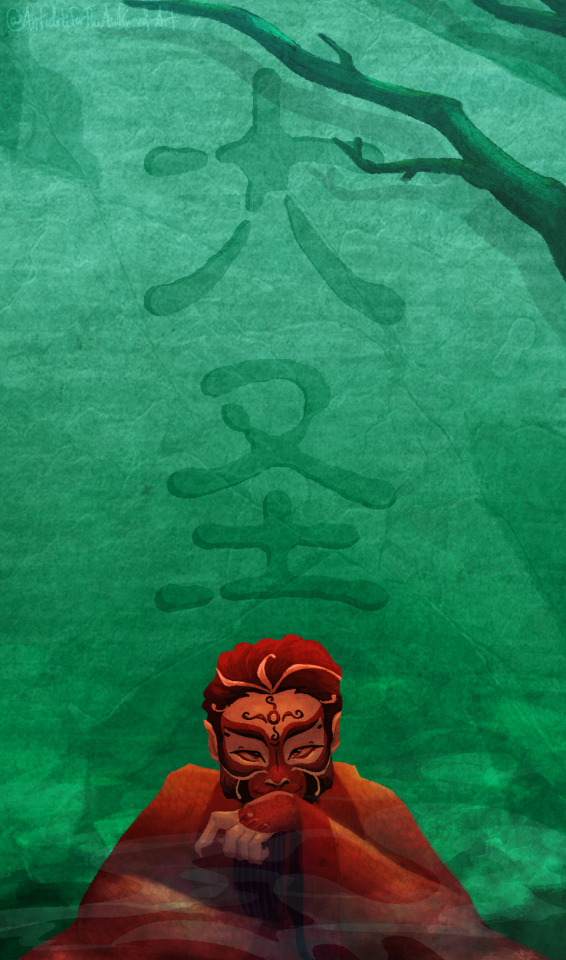
I never uploaded this cuz I didn’t like how the rendering turned out, but back in December, I thought about casting Sun Wukong as the Hecate stand-in for my Nanbei Dynasty Macbeth AU
#my art#Journey to the West#jttw#xiyouji#Sun Wukong#monkey king#William Shakespeare#Macbeth#Makbak#The Nanbei Tragedy#he's completely separate from my usual JTTW wukong just fyi#AND BECAUSE MY MACBETH AU IS UNAPOLOGETICALLY CANTONESE- HIS NAME IS SYUN NGHUNG LETS GOOOOO#yes qilins are my witch stand-ins yes qilins can foretell the fall of a great sage yes this means syun nghung is being goth#he's got like 200 years before he can get out of that mountain- let him have his fun#illustration#font is AR guyin GB bold#syun nghung
295 notes
·
View notes
Note
What nickname would you give a Chinese version of Macbeth to avoid bad luck? I imagine still referring to it as the Scottish Play would be a bit weird?
Oh hmmmm... I think I’m pretty set on this version happening in the Nanbei Dynasty so maybe something incorporating that? “The Nanbei Play” flows a bit weirdly so hmm... “The Nanbei Tragedy”?
10 notes
·
View notes
Text
Liu Youheng: Preface to the Complete Works of Kunqu Opera Peony Pavilion
Liu Youheng: Preface to the Complete Works of Kunqu Opera Peony Pavilion
The Peony Pavilion was written by Tang Xianzu of the Ming Dynasty, using the North and South Ququ card system. The North and South verses are lyrics, just like the Tang dynasty's "speaking by word", that is, each song on the day is a popular song of the day. However, because Tang’s literary talents were arbitrarily swayed, it was impossible to fill in the appropriate four-word words in accordance with the requirements of confession. Therefore, the work was born in the Ming Dynasty and can only be popular in the homework of the scholar-officials who have the ability to adapt words or aria. It can't be performed by ordinary folk troupes, because it sings and sings. In the Qing Dynasty, it was changed to a collection mode, and the original tune card was turned into a noisy music mode. However, after the Kunqu Opera was written in the Qing Dynasty, Qianlong's "Nine Palaces and Dacheng Nanbei Cimeters", he walked down the historical mainstream stage, and the music was not told. At the end of Qianlong's reign, Feng Qizhen's "Xiangxiangtang Musical Scores" spectrum is full spectrum, which is more in line with the original music of the song card; while Ye Tangna's four dreams full spectrum of this full spectrum, it is self-reformed by the drama workers. Some of the desires are not in the original music of the tune. In the past, Ye Tang had booked a more peony pavilion when he was young, but he was burned out after his death. The spectrum of later generations has many of the full spectrums of the four dreams of Ye Zitang’s self-discretion. Therefore, the truth of its music is not in the Southern Law of the Qing Dynasty. "Nine Palaces Dacheng" these "family figures", but it is the spectrum of the unfamiliar genealogy of the songs of the Kunqu Opera. The book of today's book is based on the famous family's "Nine Palaces Dacheng" and "Southern Words Law". The Kunqu songs should be checked correctly. The dissidents will explain and change from the "Family's Spectrum". Review the rules of the song to restore the correct aria. In this case, the unfortunate use of the non-famous family's "Integrated Scores" and "Nashu's Scores", because of the correct scores available, can be saved from continuing attacks, and the awakening of the Kunqu heritage. Changed from the "Famous Music" "Southern Words Law" "Nine Palaces Dacheng Nanbei Cigong", in order to meet the Ming Dynasty Kunqu should have a aria. (Liu Youheng) (2019)
劉有恒:《崑曲牡丹亭全譜》序
牡丹亭為明代湯顯祖所著,採用南北曲曲牌體製。而南北曲係依腔填詞,一如湯氏所云『按字摸聲』,即當日每隻曲牌即一首當日的流行歌曲。但因湯氏其文才所至肆意揮灑,無法一一符合照依腔填詞的要求填適當四聲的用字,故此作品出世,於明代只能流行於有改編字句或唱腔能力的士大夫的家班,而無法被一般民間戲班演出,因為唱來倒字而『拗嗓』。到清代始有改為集曲方式,把原曲牌變成雜牌曲方式演出。但因崑曲於清代乾隆初《九宮大成南北詞宮譜》成書後,走下歷史主流舞台,曲律不講,戲工以訛傳訛。而乾隆末年,馮起鳯《吟香堂曲譜》譜全譜,較合於曲牌原有曲腔;而葉堂納書楹四夢全譜譜此全譜,則依戲工以訛傳訛之譜而自我改些所欲之腔,未全合於曲牌原有曲腔。以往葉堂在年青時曾訂較合律的牡丹亭譜,但未出版而死後被其子燒掉。後世之譜,多有依葉堂此出版之自我任意改腔之四夢全譜所收之此全譜,故而其曲牌之腔實未合於清初知律名家所編的《南詞定律》《九宮大成》這些『名家之譜』,而乃係崑曲衰落後唱曲者口耳相傳之不合名家之譜之律之譜。而今此書之譜則依名家之譜《九宮大成》及《南詞定律》所審定的崑曲各曲牌應有正確唱腔予以一一核對,不合者於後注文說明並改從『名家之譜』所審訂的曲腔之律以復原正確唱腔。則於今習用非名家之譜的《集成曲譜》、《納書楹曲譜》等的不幸,因現有正確曲譜可依,而可免於繼續襲誤下去,亦崑曲傳承中之可喜賀之覺醒——改從『名家之譜』的《南詞定律》《九宮大成南北詞宮譜》,以合於明代崑曲應有唱腔。(劉有恒)(2019)
0 notes
Text
From "猥谈" to confirm Zhao Wanli's pseudo-text "Southern words lead positive" talks about the illusion of Kunshan and Gu Jian at the beginning of Ming Dynasty
From "猥谈" to confirm Zhao Wanli's pseudo-text "Southern words lead positive" talks about the illusion of Kunshan and Gu Jian at the beginning of Ming Dynasty
The author once uncovered the mystery of the palace of the Ming Dynasty from the two northern songs of Zhu Zaiyu's music (Liu Youheng: "The Ancient Chinese Music History (Ji Ji)") (2019) and "Shi Wangde" "The Rhythm": "North Yellow Bell [Drunk Flower Yin] the first word, with the sentence of Huang Zhongqing's six-syllabic" (Liu Youheng: "Kun Qu Historical Materials and Acoustic Chambers (Section 2)" (2016), When talking about the Song Dynasty's Yanle 28th Tuning, the Yuan Dynasty still remained in Yuanqu, but the Yuanqu went to the Ming Dynasty in the voice, and it has changed, giving up the obedience of the Yuanqu Song Songle 28, the Yuanqu The vocal re-architecture is under the non-Yingle 28-adjusted no-module structure, but it still adopts the sound level, but its failure to use the "catch-up", so the sound level can not be successfully changed in the early stage of the change. The scales. Until the end of the Qing Dynasty, a large number of scores were recorded, such as "The Great Scores of Music Scores", "The Law of Southern Words", and "The Palace of Jiugong Dacheng Nanbei Ci". At this time, the notation has been successfully used. Even the positive sound level of the final character of Song Yanle's 28th adjustment has been abandoned.
In fact, this is because the road is unclear. In the book, there are words of the other people’s kisses, such as “Sparing the DPRK, saying that Li is wishing to be a student in the school”, and behind him, Zhu Yunzhi’s late relatives Lu Yanzhi’s book At the beginning of the "Songs" section, there is a section that has been ignored by all Chinese music history and opera history researchers. As a result, many Yanle and opera researchers have eloquently and arbitrarily put it aside. Yuan to Ming to Qing are all articles from Yanle 28, which are filled with Yu:
"Today's world is fun, it's all simple and messy. The first song of the silk bamboo, the old rate of the old Jinyuan, slightly stored in the seventeenth house, and not prepared, only fill in the eleventh. Although I dare not look at the minister, but the vulgar department is probably worse than the Ya Department. Today's vulgar department is extremely high, and as far as its inquisition is concerned, it is undecided at first, and it is easy to move with ease at any time (this disease song and string sound is the most), and it is lost when the gold element is built. 』
According to the "Song" article in "Talking", it is about the vocal music and instrumental music of Jin Yuan and Ming, and also the drama of the vulgar. Because of the following, I will talk about the sounds of the South Opera. He said, "The song is bamboo, the old rate of the gold dollar is old, the slightest is the 17th house, and it is not prepared. It is only filled in the eleventh tone," that is, it is pointed out that it is the guardian of Yan Yuan. The "11-tone" means that the Jin Yuanqu is based on the Yanle 28, and the author of the Ming Dynasty "Lu Tan" used the word "初". This word indicates that it is Ming In the early years of the dynasty, the period of the Ming Dynasty, and the glory of the northern drama of Ming Zhuquan. Of course, we can also understand that in 1960, Zhao Wanli, who was working at the Beijing Library at that time, had allegedly falsified the so-called Kunqu's originator Wei Liangfu's "Southern Words", which was launched by the "driver" Wu Xinlei. On the scholars and experts of the South Opera in the early Ming Dynasty, Wei Liangfu, who was mistakenly pretending to be the "Southern Words", mistakenly thought that there would be Kunshan Chambers at the end of the Yuan Dynasty and the Ming Dynasty. However, the false historical material that was mistakenly biased by the letter, "Southern Words Leading Positive", and the writing of a mountain-like disapproval of historical facts.
Because, at the end of the Yuan Dynasty, the so-called false ancestor of the origin of the fake Kunqu, the era of the fake Gu Jian, it is a "song silk bamboo, the old rate of gold, the slightest seventeen palaces" and "and its sound", not "initial" Undecided, one-time high and easy to move with the work (this disease song and string sound is the most), and like the "golden yuan system" era, is to guard Yanle 28 to adjust for the card, but not without Keep the Yanle 28 tone, and arbitrarily put the "sound" to "shift".
Otherwise, it is like the beginning of the "Southern Words" is pulled into the supporting role of the end of the Yuan Dynasty, the great writer Yang Weiwei, also heard the performance of the South Opera, but also gave poems to the monks, when the South Opera, the literati can be used according to the old cards The four sounds were filled in to write a play or to write a song, but in the aria, it was taken from the old Nan opera that was born out of the Southern Book Club.
At the beginning of the Ming Dynasty, when there was Ming Taizu, the Liu Liu long system of the singer of the singer came to sing the South Opera, and the beginning of the four major voices of the New South Opera began to slowly stop, and the cavity of the "strings and organs" The Liu color is long, and it is a great project for each song card of "Yi Kee". Of course, he may also refer to the lyrics of the South Opera from the Southern Song Dynasty to the Yuan Dynasty, as Yang Weiwei once heard, but It should be the voice of the South Opera, singing the vocals of only the cards. The "this cavity" of the used cards is the source of the song. Because the music of the court is scattered into the folk, "there are Nanqu in the beginning, only the strings. Gradually, the temperament is entangled in luxury, the economy is developed day by day, and the new chambers of various changes in various places have been newly created, resulting in the competition of the South Opera, which is a great achievement, so it is really the voice of the South Opera. originator. Shen Chongxi's "Section of Strings": "Southern Songs is well prepared for the Ming Dynasty. Although there were Nanqu at the beginning, only the string was used. 』It has fully explained the South Opera in the early Ming Dynasty, "only use the string of the official language", but also another evidence shows that in the early Ming Dynasty, there was a pseudo-"Southern Citing" which said Kunshan cavity and the so-called never inflow Gu Jian pseudo-persons found in the genealogy of the square. In the same way, there will be no sea salt chambers. Although some people think that the novels of the people are considered to be the Yunyun or Yang Lan of the Yuan Dynasty or Zhang Wei who is obviously advocating the great music. (Liu Youheng, 2019, 11, 3 in Taipei)
0 notes